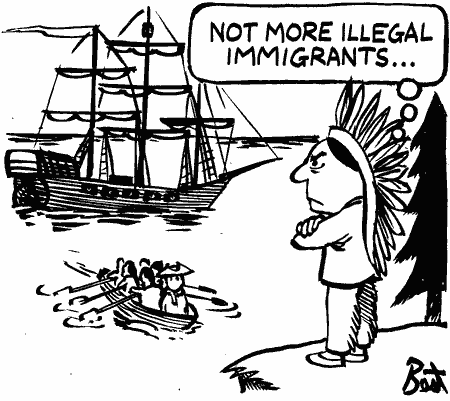 Another Stereotype of the Month entry:
Another Stereotype of the Month entry:
 Another Stereotype of the Month entry:
Another Stereotype of the Month entry:
Should Gambling be a Monopoly Limited to Indians?
Written by Vincent Gioia
Sunday, September 10, 2006
— And what about separate 'Nation' status for Indian Tribes?
Indian Tribes are sacred cows and their importance grows with their casino monopoly-generated wealth.
It has become taboo to say or write anything critical about Indian Tribes; well I'm not a politician, I don't need campaign contributions and I'm not a community that needs to play kissy-face with Indian Tribes for a casino monopoly-generated money hand out.
It galls me when I see television adds telling me that Indian gambling is good for me and the rest of us. The fact is that revenue from gambling may be beneficial to the public, but the benefit would be the same regardless who owned the gambling casinos. That's not to say the tribes are not clever to advertise this propaganda, after all the more public support they get, the easier it is to have their way with the state and local authorities.
And what is this business about "Sovereign Indian Nations"? Since when can we have a separate "country" within the "good ole USA"? Indian Tribes claim separate "Nation" status when it suits them and rights of American citizens when they think it is helpful for some purpose. A couple of years ago a member of a "Sovereign Indian Nation" decided to run for the California assembly. The menu for that Indian was cake; both have and eaten.
How often do we see Indian Tribes try to exempt themselves from U.S. law? Indian tribes "contribute" to politicians in large amounts yet they want to keep their contributions secret. Federal and state laws require disclosure of political contributions but Sovereign Indian Nations believe they are above the law and should not be held to the same standards. Labor laws are designed to protect employees but Indian Tribes think those laws do not apply to them. The rest of us pay taxes on all income, casino income to Indians is not taxed. Large and small businesses pay sales tax on products sold, Indian Tribes do not.
Indian gaming is not small business; in total throughout the country Indian casino revenue is over $22 billion dollars a year (that's billion with a "b" and that's each year). Gambling monopolies were given to Indian Tribes for the purpose of "improving the lives of Indians." Are we there yet? Distributing 22 plus billions of dollars each year for an indefinite period of time among several thousand Indians in the country surely ought to have accomplished life improvement. Do Indian Tribes still need gambling monopolies? Should gambling now be open to all businessmen and communities, or is the Indian gambling monopoly eternally engraved in stone?
Public law enforcement and courts are a fundamental fact of life throughout the country. Law enforcement officers are empowered to enforce federal, state and local laws and violators are brought to justice in U.S. courts, but not in Sovereign Indian Tribal Nations; they have their own police and courts. How nice.
Let's go back to the "benefits" of "Indian Gaming." Are the benefits to communities and states due to the Indian ownership of gambling casinos, or to the fact that gambling brings in a lot of money? This is not rocket science, if gambling casinos are lucrative (Las Vegas was not built by gambling winners), and states and communities believe gambling is morally acceptable, why not open the business of gambling to all, subject to control, rules and regulations, just as in those places where gambling is legal.
It seems that Sovereign Indian Nations are just Indians that are organized together into some form of organization. They own land and businesses. They live in the United States, like the rest of us, and do business in the United States just like the rest of us. Why can't members of Indian tribes be treated like all American citizens with the same rights and privileges, duties and obligations? Yes, their ancestors were here a long time ago, but so were the ancestors of many others of us. For the most part "legal" immigrants and their progeny made this country great, not Indians. Immigrants assimilated, got educated, worked hard and bettered their lives for themselves and their children (and these immigrants were not here for hundreds of years). Anti-discrimination laws enacted many years ago made sure the "American Dream" was available to all. Anyone that did not follow this path has no right to depend on special privileges and special legal rights should not be carved out just for their benefit; we should all have the same opportunity, not more not less, that's what this country is all about.
About the Writer: Vincent Gioia is a retired patent attorney with an active interest in politics and current events. He writes about issues that he believes have been misrepresented by the liberal media.

Rob's reply
>> It has become taboo to say or write anything critical about Indian Tribes <<
Yeah, that's why half the entries in the Stereotype of the Month contest deal with assaults on tribal sovereignty and the alleged greed of Indians. Like this one.
>> The fact is that revenue from gambling may be beneficial to the public, but the benefit would be the same regardless who owned the gambling casinos. <<
This is largely true, although one could argue that an Indian casino free of state taxes is a more powerful economic engine than a similar casino paying state taxes. After all, the conservative dogma says that private industry can spend its money more fruitfully than government can, right?
>> And what is this business about "Sovereign Indian Nations"? Since when can we have a separate "country" within the "good ole USA"? <<
Native nations were sovereign entities before the United States existed. So you might ask how a separate "country" could form on the North American continent when it was already occupied by countries.
But if you want a specific answer, the year was 1788. That's when the Constitution, which equated Indian tribes with foreign nations, was ratified.
>> Indian Tribes claim separate "Nation" status when it suits them and rights of American citizens when they think it is helpful for some purpose. <<
More accurately, they usually claim both because they have both. They have a unique place in the American system. Your ancestors set up this system by conquering the Indians, signing treaties with them, and placing them on reservations. Now deal with the consequences of your ancestors' actions.
>> How often do we see Indian Tribes try to exempt themselves from U.S. law? <<
I'd say rarely, since tribes are subject to most federal laws.
>> Federal and state laws require disclosure of political contributions but Sovereign Indian Nations believe they are above the law and should not be held to the same standards. <<
They believe they're independent of state laws because they're governments just like state laws. Hello? That's inherent in the concept of sovereignty. Look it up if you don't know what it means.
They hold themselves to the same standard that any citizen of a state does. Namely, they're bound by federal laws and the laws of their own government, but not those of a neighboring government. Your error is thinking that a state government necessarily supersedes a tribal government. No, it doesn't.
>> Labor laws are designed to protect employees but Indian Tribes think those laws do not apply to them. <<
When it comes to state labor laws, they may be right.
>> The rest of us pay taxes on all income, casino income to Indians is not taxed. <<
Wrong. Indians pay federal income tax on any distributions they get from their casinos.
>> Large and small businesses pay sales tax on products sold, Indian Tribes do not. <<
That's because Indian casinos aren't businesses in the traditional sense. They're government-run enterprises akin to a state lottery. States don't pay taxes on their lotteries to other states or to the federal government. Tribes are in a similar position.
>> Gambling monopolies were given to Indian Tribes for the purpose of "improving the lives of Indians." <<
Any state can vote to legalize casinos for everyone, and some states have done this. If a state's citizens choose to give Indians a "monopoly" on gaming, that's their democratic right.
>> Distributing 22 plus billions of dollars each year for an indefinite period of time among several thousand Indians in the country surely ought to have accomplished life improvement. <<
And so it has. Gaming has helped many of the tribes that chose to pursue it tremendously. See Hard Evidence that Indian Gaming Works for the details.

"Monopolies" still ncessary?
>> Do Indian Tribes still need gambling monopolies? <<
Depending how you define "need," some may not need a monopoly anymore. So? States are free to end the monopoly any time they want.
>> Law enforcement officers are empowered to enforce federal, state and local laws and violators are brought to justice in U.S. courts, but not in Sovereign Indian Tribal Nations; they have their own police and courts. <<
Wrong again. Tribes are subject to enforcement by federal officers (FBI, BIA, etc.). Many are also subject to enforcement by state officers in violation of their sovereign status.
>> Are the benefits to communities and states due to the Indian ownership of gambling casinos, or to the fact that gambling brings in a lot of money? <<
Probably the latter. So?
>> This is not rocket science <<
The concepts of tribal sovereignty and the states' right to allow gambling seem to be rocket science to you.
>> why not open the business of gambling to all, subject to control, rules and regulations, just as in those places where gambling is legal. <<
Go for it. Who's stopping you? Quit wasting time talking about it and do it. Get off your butt and start working to pass a law legalizing all forms of gambling in your state.
>> It seems that Sovereign Indian Nations are just Indians that are organized together into some form of organization. <<
It seems you're ignorant of tribal sovereignty.
>> Why can't members of Indian tribes be treated like all American citizens with the same rights and privileges, duties and obligations? <<
Because they're members of sovereign nations.
>> Yes, their ancestors were here a long time ago, but so were the ancestors of many others of us. <<
Their ancestors were here 10,000, 20,000, or 50,000 years ago. Yours were here 100, 200, or 500 years ago. So they've been here approximately 100 times as long as you've been here. That gives them the original ownership rights to the continent.
>> For the most part "legal" immigrants and their progeny made this country great, not Indians. <<
Immigrants "made this country great" by killing the Indians, you mean. See The Myth of Western Superiority for more on the subject.
>> Anti-discrimination laws enacted many years ago made sure the "American Dream" was available to all. <<
That's a crock. See Highlights of the US Report to the UN on Racism for more on the subject.
>> Anyone that did not follow this path has no right to depend on special privileges and special legal rights should not be carved out just for their benefit <<
Indians have every right to follow whatever path they want. Their rights are enshrined in various laws and treaties that are all legally binding. If you don't like it, leave. Go somewhere where your ancestors didn't make deals with the land's original inhabitants.
Related links
The facts about tribal sovereignty
The facts about Indian gaming
Readers respond
"Oh, wow, writerfella just LOVES ostensibly informed idiocy such as was exemplified in this enraged article."
|
. . . |

|
All material © copyright its original owners, except where noted.
Original text and pictures © copyright 2007 by Robert Schmidt.
Copyrighted material is posted under the Fair Use provision of the Copyright Act,
which allows copying for nonprofit educational uses including criticism and commentary.
Comments sent to the publisher become the property of Blue Corn Comics
and may be used in other postings without permission.